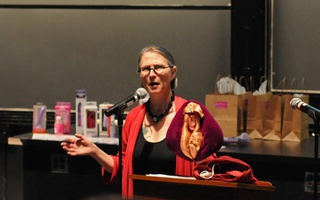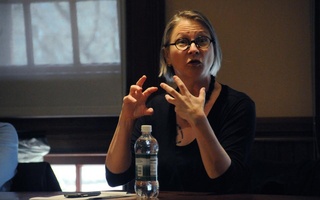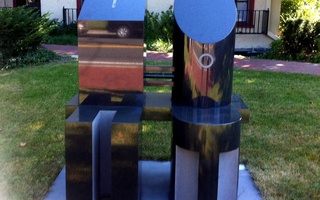A fair-skinned beauty courageously escapes from an evil queen by staying with seven small men before falling in love with a handsome prince. Sound familiar? It should. The beloved fairy tale “Snow White” has been reincarnated as “Mirror Mirror,” a star-studded, socially-aware, family-friendly spectacle. But although the formula is similar to the slightly gruesome Grimm Brothers’ original, “Mirror” effectively features beautiful costumes, humorous quips, and feminist concerns. Despite some blandness in the acting, the result is a wholesome and surprisingly entertaining film.
Snow (Lily Collins) is an 18-year-old princess, deemed as a “pathetic shut-in.” The Queen (Julia Roberts) has ascended to the throne after the King is supposedly killed by a beast. As in the fairy tale, she prioritizes her vain desire to be the most beautiful woman in the realm over all else, including Snow’s happiness. There’s just one complication: the Queen is broke. As a solution, she hopes to marry a young, wealthy and, of course, handsome prince (Armie Hammer). Coincidentally, he is the very same prince that Snow stumbles across in the woods, tied up in a tree by the seven dwarves, and, naturally, falls in love with at first sight.
Between the Prince and Snow White—not to mention the stunning queen—the cast is so beautiful it was hard to look away. Hammer’s attractiveness is blatantly acknowledged from the beginning, with the Queen saying, “Will someone please lend this man a shirt so I can concentrate?” While other interpretations of the fairy tale often concentrate on the fearsome forest or wily machinations of the Queen, “Mirror” pays close attention to the elements of the story that concentrate on vanity, with exquisite costumes for the entire cast—especially Roberts—and imaginative scenery.
As befits a children’s film, there is plenty of humor geared towards a younger audience. In one scene involving prolonged use of computer animation, the seven dwarves play a sort of whack-a-mole with one of the evil Queen’s mystical marionettes. Supplemented by a heavy dose of punches to the face, the slapstick humor between characters eventually becomes wearisome.
Although there are times at which “Mirror” milks the corny fairy tale card, such as the token “ding” following the Prince’s toothpaste-commercial smile, at other times the directing veers far away from the traditional plotline or even the aesthetic of the original Disney animated film. For example, the dwarves retain none of the same names, although one of them is still a little grumpy and another acts very dopey. Their costumes aren’t the standard elfish pajamas but rather worn, mossy-looking leather.
A fresh aspect of the film is Snow’s independence. The now pants-wearing Snow joins the gang of seven shorter-than-average men in their thieving endeavors, although she insists that they only steal from the Queen and give everything back to the poor village people who have been taxed up the backside to help finance the Queen’s parties. She refuses to allow her prince to save her from harm, instead choosing to fight the beast himself. At one point she even swordfights her “Prince Charming,” complete with witty repartée and touchés.
While the actors probably won’t be winning any Oscars for their performances as essentially remastered cartoon characters, some of the cast nonetheless did a commendable job of fleshing out their characters. Roberts does the Queen justice by managing to show both her vulnerability and her vanity simultaneously. Hammer humorously engages in some self-deprecation by demonstrating his less-than-glamorous side when he slobbers all over people, sweating and panting under a puppy spell—a refreshingly humble turn after his arrogant role as both Winklevi twins in “The Social Network.” However, the acting still remains the weakest aspect as the draw of the visually-oriented movie overshadows the characters within it.
Overall, the film put a well suited modern spin on a familiar story. Between the beautiful cinematography and underlying messages of social acceptance, the whole experience is justifiably sweeter than the Grimm Brothers’ original.
Read more in Arts
Going on the RecordRecommended Articles
-
She's All That, But He's Even MoreSHE'S ALL THAT Miramax Films Directed by Robert Iscove Starring Freedie Prinze, Jr., Rachael Leigh Cook, Matthew Lillard "Yet another
-
Harvard Alum Appointed Governor General of CanadaCanadian academic David L. Johnston '63 will take the seat of governor general on October 1 to serve as the de facto head of state and representative of the Queen.
-
 Seminar Demystifies The Female Orgasm
Seminar Demystifies The Female Orgasm -
 Carol Queen Speaks of Positive Porn
Carol Queen Speaks of Positive Porn -
 The Thrones of Garden Street
The Thrones of Garden Street -
DHO's 'Cinderella' Updates a ClassicThe plot of Jules Massenet’s opera “Cinderella” is essentially the same as that of the Disney movie everyone grew up ...













